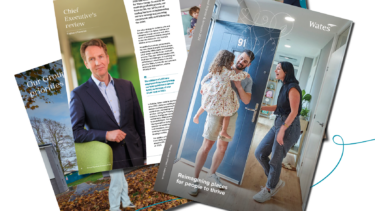In his recent article published by the Financial Reporting Council, Sir James Wates CBE reflected on the direction of corporate governance reporting and praised companies that are clearly grasping the spirit of the Wates Principles.
While admitting there have been some disappointments, he praised companies that seize the opportunity to use their governance reports to communicate openly, concretely with their stakeholders, not just tick boxes. He highlighted that some companies are using the Wates Principles to identify some of their own governance weaknesses and make corresponding improvements to their governance arrangements.
An abridged version of an article originally published on the website of the Financial Reporting Council.
There has been a lot of attention paid recently to corporate governance reporting, and we’re seeing more recognition that reports need to move beyond a tick-box approach and really communicate with stakeholders.
I’m pleased that the Wates Principles have been well received. We launched the principles slightly more than two years ago, when the government had introduced legislation requiring large private companies to report on their corporate governance.
The law took effect for financial years starting on or after 1 January 2019, and because the pandemic delayed the publication of many reports, we have only recently seen some trends developing.
Grasping the spirit
Many companies have clearly sought to grasp the spirit of the Principles and have provided good explanations of how their governance arrangements work. We’ve seen for example in the reports of Allianz Holdings (UK), Heathrow, Jaguar Land Rover, and Tata Steel some rigorous analyses of how the Wates Principles are applied.
Heathrow provides a helpful one-page overview that shows how elements of their corporate governance specifically correspond to the Wates Principles, with cross-referencing to other information in their 20+ page Corporate Governance section. Several other companies also use cross-referencing effectively to keep their Wates Principles reporting concise and pitched at the right level of detail.
The Wates Principles should be a guide for self-improvement, so I was pleased to see that Tata Steel explicitly described how applying the Wates Principles led it to reconsidering its Remuneration Committee terms of reference. Thame and London (Travelodge) also said they would be reviewing their governance arrangements using the Wates Principles as a guide.
It’s great to see that some wholly-owned subsidiaries (who are covered by the legislation and must report) such as Northern Bank and Mercer UK are not just referring to their holding company governance standards, but are applying the Wates Principles and commenting specifically on how they apply to the subsidiary.
Some companies provide illustrative examples of issues that their boards are grappling with; this is absolutely critical to give readers an idea of what’s being discussed around the board table. Chanel, Edrington Group, and Jaguar Land Rover all do well in this regard, with the latter being noteworthy for its effective use of graphs and charts which add detail to the narrative.
Balancing tensions
It’s always a challenge to decide the right quantity of material to report. There is a tension between providing enough evidence to assure readers that you take your governance seriously, and keeping the report short and easy to read, in line with the spirit of the Wates Principles.
In tackling this challenge now for the third time, the Wates Group has found that a good deal of the ‘evergreen’ material can be presented elsewhere in the Directors Report, and the section dedicated to Corporate Governance can just focus on what changes year to year.
Broadly speaking, we are seeing clear efforts by companies to apply and explain their governance as is the letter of the law and the spirit of the Wates Principles. Unfortunately, however, some companies are taking a clearly minimalist approach for example, a one sentence response to Risk and Opportunity — which evokes a sense of box-ticking and does not inspire confidence.
Some disappointments
As the FRC and others have identified, there is often a sense that companies do not fully embed Purpose in their organisation. Generally, companies do state what their purpose is, but their reporting lacks a sense of authenticity, sounding more like marketing material than an account of how the company actually runs. Many reports fail to provide specific examples of how the purpose has actually guided board-level discussions and decisions. I hope we will see more rigorous reporting on purpose in the future.
Few make the corporate governance report easily accessible on their website. The law says the statement must be on the website, but if one has to hunt around in the Annual Report PDF, it rather contradicts the idea that the statement should be aimed at a broad range of stakeholders, not all of whom are experts and know where to find it.
Going forward
I am optimistic that as companies become comfortable with the process of applying the Wates Principles there will be an improvement in the quality of reporting. The FRC is commissioning a research project to give us a more thorough picture of exactly who is using the Wates Principles, and which of those companies is doing it well. We’ll use that research to highlight and promote good practice to “name and fame” those who take their reporting seriously.
Good practice will also be guided by other work that the FRC is doing. For example, I found their blue-sky thinking in A Matter of Principles; the future of corporate reporting to be refreshing. Amongst other thought-provoking points, they have highlighted some common sense principles of good communication that should apply to all corporate governance reporting:
- Brevity, Comprehensibility and Usefulness
- Relevance
- Company-specific
- Comparability
The latter of these principles may take time for which to develop good practice, but the first three of these should be clear to all, and I hope to be seeing more of them in practice in Wates Principles reports to come.






